The above video is an undercover film made by the NGO Global Witness on land sales in Sarawak
The television presenter Ben Fogle has been accused of taking part in an environmental propaganda campaign for a regime with one of the world’s worst records in deforestation. Fogle, known to millions of BBC viewers as a face of travel documentaries, has become the poster boy for tourism to the controversial state of Sarawak in Borneo, where vast amounts of industrial logging have left only five per cent of forests that have not been either logged or converted to palm oil plantations.
The presenter has made a series of films for the Sarawak Tourism Board under the title “Ben Fogle’s Sarawak Adventures” in which he is pictured playing with orang-utans and swimming in waterfalls. Fogle wrote about his trip to Sarawak, which is part of Malaysia, in his “Ben Fogle, The Adventurer” column for the Daily Telegraph and in a large article in Hello!
Fogle’s material has been widely promoted to a network of “mummy bloggers” encouraged to share the films and invited to meet the presenter at a champagne reception this week in London. Some believed they would be offered the chance to join a “Sarawak Blogger Ambassador Club” and go on a trip to Borneo.
Sarawak has the fastest rate of deforestation in Asia and exports more tropical logs than Africa and Latin America combined. It has only 0.5 per cent of the world’s tropical forest but accounted for 25 per cent of tropical log exports in 2010.
Fogle’s involvement in the PR campaign has shocked critics of the Sarawak government and its appalling record on conservation. “It seems Ben Fogle may have been made a pawn,” said Clare Rewcastle, founder of the Sarawak Report blog. “Anyone with the slightest knowledge of environmental matters should know the issues around Malaysian oil palm destruction and the culpability of the Sarawak state government.
“He should not be promoting them for responsible eco-tourism or pretending that they are protecting the jungle habitat of the orang-utan. The only place you can find orang-utan in Sarawak is in caged enclosures or in a few remaining patches of jungle where the state government is at loggerheads with the local tribes because it has issued licences to cut it down.”
Fogle told The Independent he has “postponed” the champagne event after being “horrified” by recent revelations, including an undercover investigation by the NGO Global Witness. He said he would not be making any more films for the Sarawak Tourism Board until he received answers to “many questions” that he now had.
In his travel piece in the Telegraph in February, Fogle talked of his adventure “deep in the primary rainforest of Malaysian Borneo” where he “came face to face with a ‘man of the forest’ – as the name orang-utan means in the local language”. He later explained that the orang-utans at the Matang Wildlife Centre, outside state capital Kuching, had been “uprooted by deforestation or poaching”. But the impression of a heavily forested region was reinforced by the description of a later journey in search of a rare flower. Another article appeared in Hello! Both pieces were proudly featured on the Sarawak Tourism Board’s website.
In the opening words to one of his films for the Sarawak Tourism Board, Fogle says: “This is one of the most beautiful rainforest regions on the planet... This is the future of conservation here in Sarawak... looking after this pristine environment and the riches this country has.”
The impression given is of a state that cares deeply about forest preservation. “Whoever advised Ben Fogle that doing PR for the Sarawak government on environmental issues was a good idea has let him down badly,” said Tom Picken of Global Witness. “Promoting tourism in Sarawak is positive in itself, but it must not gloss over the environmental destruction and exploitation that is devastating the region.” The images of the handsome presenter and the orang-utans have proved irresistible to a community of “mummy bloggers” who were encouraged to share the video by publicists, British travel PR firm Hills Balfour. “Ben Fogle in Sarawak with orphaned orang-utans – Ben compares them to his children! They’re so cute,” the PR firm tweeted.
Fogle revealed he would not be hosting any Sarawak event “until I have investigated further” and gave a lengthy response on his Sarawak “adventures”. He said he carried out “due diligence” on Sarawak and information from the International Tropical Timber Organisation suggested there had been “an improvement in forest management”, adding: “I visited Sarawak on the understanding that the environmental situation has been improving.”
Fogle said he stood by his description of Sarawak’s beauty: “It was breathtakingly beautiful. While I observed some palm oil from the air while flying into Kuching, I did not visit the areas of deforestation. I was in Sarawak to make some short films about adventurous travel for Sarawak Tourism’s website.”
He said he had not used the expression “eco-tourism” in relation to Sarawak. He said that the orang-utans he had seen had not been in the wild but said they were being well cared for. But he had been “horrified” by the Global Witness findings released last week, which he was only aware of after his visit: “I have been in touch with Global Witness to raise my concerns and to discuss what can be done. I was aware of online allegations of corruption, but most governments – including our own – have also had allegations of corruption levelled against them.
“I make a distinction between the Sarawak Tourism Board and Taib Mahmud [Sarawak Chief Minister]. I was in Sarawak to promote tourism which employs thousands of people and is estimated to be worth more than a billion pounds to the economy. I have never knowingly supported the ‘regime’.”
Fogle said he tried to avoid political issues: “There are those who firmly believe in sanctions and boycotts to resolve political issues but I have always believed in supporting tourism.”
He said he had been previously unaware of the plight of Sarawak’s indigenous people as a consequence of logging. “I was not aware until the publication of the Global Witness video. I am horrified by the revelations.”
Hills Balfour defended its own role for Sarawak. “As a travel PR company, we believe in promoting tourism as a growing part of Sarawak’s economy,” it said. “It creates thousands of jobs for Sarawakians and is the life blood of a developing industry which helps support many of the local communities.”
Mishcon de Reya, the London law firm representing Chief Minister Taib, issued a statement in response to the Global Witness film: “The government of Sarawak issues licences for land in very controlled circumstances... This is an administrative exercise, not political patronage. Our client never demands or accepts bribes for the grant of licences and leases.”
Sarawak: forest for sale
Sarawak is one of two Malaysian states on the island of Borneo and for the past 32 years has been run like a personal fiefdom by Taib Mahmud, 76, the Chief Minister. The state has the fastest rate of deforestation in Asia and exports more tropical logs than Africa and Latin America combined. Less than five per cent of its rainforest remains in a pristine state. Much of the logging has taken place on the ancestral lands of the state’s indigenous peoples.
For a hundred years from 1842, Sarawak was ruled by a British family – the Brooke dynasty of “White Rajahs” – appointed by the Sultan of Brunei. During the Second World War it was occupied by the Japanese and it became a British colony in 1946 before being granted independence and joining the federation of Malaysia in 1963.
Global Witness last week released an undercover film exposing how relatives of Taib were prepared to make corrupt deals with filmmakers posing as foreign investors looking to buy land that would be logged and cleared for oil palm plantations. The buyers were told by lawyers acting for Taib’s relatives that the money should be put through Singapore in order to avoid Malaysian taxes.
Taib is currently the subject of an official probe by the Malaysian Anti-Corruption Commission. “This film proves for the first time what has long been suspected – that the small elite around Chief Minister Taib are systematically abusing the region’s people and natural resources to line their own pockets,” said Tom Picken, Forest Team Leader at Global Witness.
Taib’s lawyers said land licences were issued in “controlled circumstances” and that the Chief Minister “never demands or accepts bribes”.

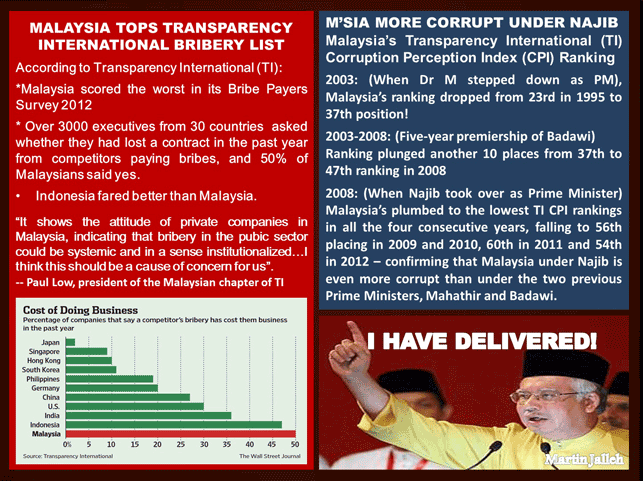
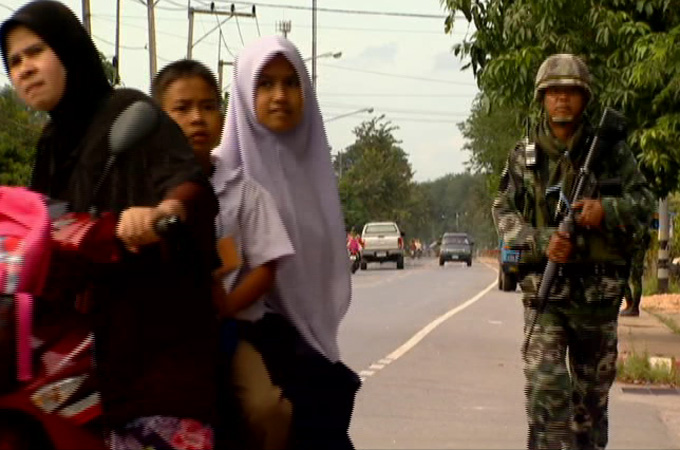
 After
all, he was an advanced septuagenarian when he retired, an age that's
not exactly hospitable to a post-race lap. Further, he disclaimed any
interest in a Lee Kuan Yew-like minister mentor role.
After
all, he was an advanced septuagenarian when he retired, an age that's
not exactly hospitable to a post-race lap. Further, he disclaimed any
interest in a Lee Kuan Yew-like minister mentor role. Talk
of confidence-building measures, this is like telling a friend who
faces the prospect of being hung in a few weeks' time that you have
withdrawn your support for the abolition of capital punishment.
Talk
of confidence-building measures, this is like telling a friend who
faces the prospect of being hung in a few weeks' time that you have
withdrawn your support for the abolition of capital punishment. Two
months later, in March 2004, Abdullah won an overwhelming endorsement
at GE11, a victory that would have made his preference of a deputy,
subtly conveyed of course, irresistible to Umno delegates at the
subsequent elective assembly of the party.
Two
months later, in March 2004, Abdullah won an overwhelming endorsement
at GE11, a victory that would have made his preference of a deputy,
subtly conveyed of course, irresistible to Umno delegates at the
subsequent elective assembly of the party.

 He said this when asked to comment on his interview with foreign news service AFP,
during which he made the same remark, though the veteran Umno leader
explained that this was just his view of things, which may not
necessarily pan out.
He said this when asked to comment on his interview with foreign news service AFP,
during which he made the same remark, though the veteran Umno leader
explained that this was just his view of things, which may not
necessarily pan out.



 The
EC, as the BN government's mouthpiece, has already announced that
elections to Parliament and all state assemblies (except Sarawak) would
be held on the same day. For practical purposes, this means the four
Pakatan governments of Kelantan, Kedah, Penang and Selangor have
absolutely no say on the fixing of the dates of their state elections.
The
EC, as the BN government's mouthpiece, has already announced that
elections to Parliament and all state assemblies (except Sarawak) would
be held on the same day. For practical purposes, this means the four
Pakatan governments of Kelantan, Kedah, Penang and Selangor have
absolutely no say on the fixing of the dates of their state elections. Instead,
Article 56(4) of the Second Part of the Negri Sembilan constitution
goes into effect today, and the assembly will automatically be dissolved
at midnight. Historians would have to advise whether this is the first
occasion that this has happened in Malaysia.
Instead,
Article 56(4) of the Second Part of the Negri Sembilan constitution
goes into effect today, and the assembly will automatically be dissolved
at midnight. Historians would have to advise whether this is the first
occasion that this has happened in Malaysia. However
what the Negeri government cannot do is to enter into new contracts,
transactions or deals in the next 60 days. If a third party is reckless
to execute such a contract, it does so at its peril. And if the people
of Negri elect a Pakatan state government, it is entitled, in the public
interest, to terminate such a contract.
However
what the Negeri government cannot do is to enter into new contracts,
transactions or deals in the next 60 days. If a third party is reckless
to execute such a contract, it does so at its peril. And if the people
of Negri elect a Pakatan state government, it is entitled, in the public
interest, to terminate such a contract.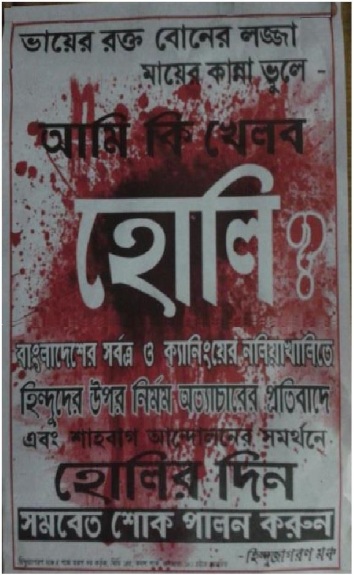
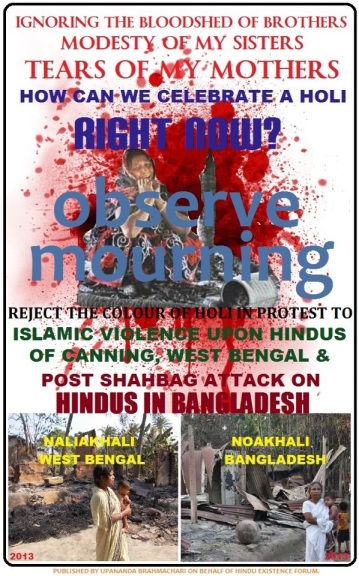
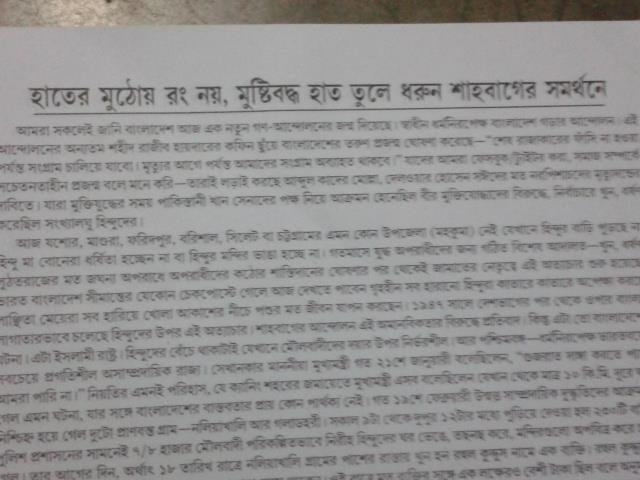
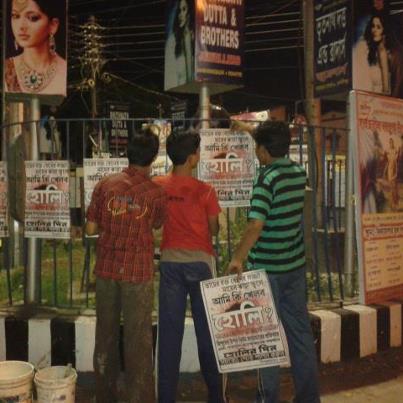








 "We
will consider the Bar Council's suggestion, but we just cannot re-open
all cases, including those of the 1960s. There must be new evidence to
justify the re-opening of a case. The case has gone through a trial,
where everything was adduced," Gani (right) said.
"We
will consider the Bar Council's suggestion, but we just cannot re-open
all cases, including those of the 1960s. There must be new evidence to
justify the re-opening of a case. The case has gone through a trial,
where everything was adduced," Gani (right) said. This follows a
This follows a  "Equally
important would be the question as to who exactly ordered the killing
and why, especially in a case where the evidence shows that the accused
did not know the deceased. So why kill the deceased?" he asked in a
statement.
"Equally
important would be the question as to who exactly ordered the killing
and why, especially in a case where the evidence shows that the accused
did not know the deceased. So why kill the deceased?" he asked in a
statement.